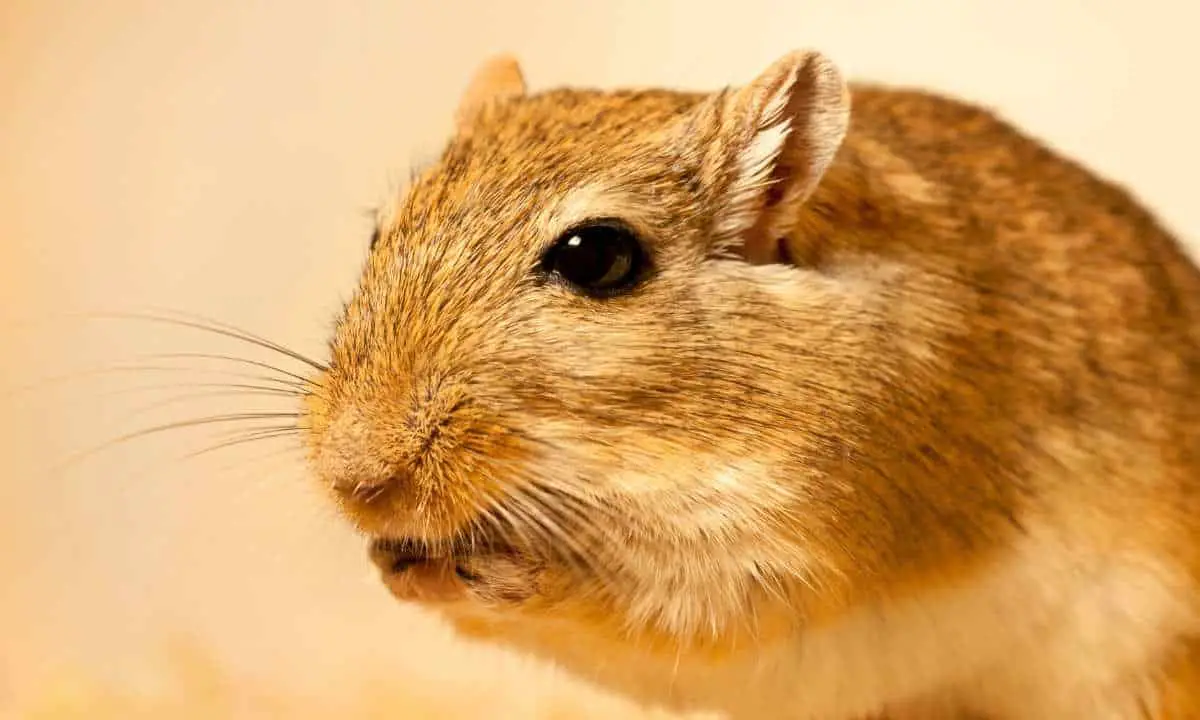As a gerbil owner, it’s normal to form a deep bond with your little pet. These small, sweet, and active rodents are popular pets that can quickly become part of the family. However, there comes a time when you might notice that your gerbil is dying. This can be a difficult time, but it’s important to remember that there are ways to comfort a dying gerbil.
Understanding the lifespan of a gerbil and recognizing the signs of a dying gerbil are some of the first things you need to know. Gerbils, like many small pets, don’t live as long as larger animal species, and their health can decline rapidly. When this happens, it’s crucial to try to comfort your gerbil and make their final moments as comfortable as possible.
Table of Contents
Ways to provide Comfort a Dying Gerbil
- Providing Warmth: As their body shuts down, gerbils may become cold. One of the first things you can do is to keep your gerbil warm. This can be done by adding extra bedding to their cage, using a safe heat mat, or placing a warm water bottle in their cage. Remember, the goal is to keep them warm, not hot, so it’s best to monitor the temperature closely.
- Offering Favorite Treats: Gerbils may find comfort in their favorite treats. If your gerbil still has an appetite, offering them their favorite treats can provide some relief. However, it’s important to remember that feeding should be done gently and without causing distress.
- Minimizing Loud Noises: Gerbils, being small and sensitive creatures, can be disturbed by loud noises. Try to minimize these in their environment to help them rest and sleep.
- Providing a Comfortable Environment: Make sure their cage is clean and comfortable. This includes ensuring they have enough bedding to snuggle in and that their food and water are easily accessible.
- Giving Your Gerbil Affection: If your gerbil is comfortable being handled, gently petting them can provide comfort. However, it’s important to be gentle and not to handle them if they’re in distress or discomfort.
Remember, every gerbil is different and what works for one may not work for another. It’s important to pay attention to your gerbil’s behavior and adjust your approach accordingly. If you’re unsure about anything, it’s always best to consult with a vet. They can provide professional advice and help you ensure your gerbil is as comfortable as possible during this difficult time.
In the following sections, we’ll delve deeper into these topics and provide more detailed advice on how to comfort a dying gerbil. We’ll also discuss how to handle the grief of losing a pet and how to take care of other gerbils in the cage during this time. So, let’s dive in and explore these topics further.

Recognizing the Signs of a Dying Gerbil
When your gerbil is nearing the end of its life, it’s crucial to recognize the signs so you can provide the best comfort possible. Gerbils, like all animals, exhibit certain behaviors and physical changes when they’re about to die. As an owner, understanding these signs can help you make sure your pet is as comfortable as possible during their final days.
Here are some common signs to look out for:
- Changes in Behavior: Gerbils are typically active and curious creatures. If you notice that your gerbil is less active than usual, or if they’re not showing interest in their favorite activities, this could be a sign that they’re not feeling well.
- Changes in Appetite: A decrease in appetite is another common sign. If your gerbil is eating less than usual or showing no interest in their favorite treats, this could indicate that they’re nearing the end of their life.
- Physical Changes: Look out for physical changes such as weight loss, dull or unkempt fur, or difficulty moving around. These can all be signs that your gerbil’s health is declining.
- Changes in Social Behavior: Gerbils are social animals and often enjoy the company of other gerbils in the cage. If your gerbil is isolating itself or showing signs of aggression towards cage mates, this could be a sign of distress.
If you notice any of these signs, it’s important to consult with a vet as soon as possible. While it may not be possible to save a dying gerbil, a vet can provide guidance on how to make your pet as comfortable as possible during their final days.
Remember, every gerbil is unique and may exhibit different signs. It’s crucial to pay close attention to your gerbil’s behavior and physical condition and to provide them with the care and comfort they need during this difficult time.
In the next section, we’ll discuss how to create a comfortable environment for your dying gerbil, including tips on providing warmth, minimizing noise, and ensuring a clean and comfortable cage.
Creating a Comfortable Environment for Your Dying Gerbil
When your gerbil is nearing the end of its life, one of the most important things you can do as an owner is to create a comfortable environment. This can help your gerbil feel safe and secure and can make their final days as peaceful as possible.
Here are some tips on how to create a comfortable environment for your dying gerbil:
- Maintain a Warm Environment: As mentioned earlier, gerbils can become cold as their body shuts down. To keep your gerbil warm, consider adding extra bedding to their cage, using a safe heat mat, or placing a warm water bottle in their cage. Always monitor the temperature to ensure it’s not too hot.
- Minimize Noise: Gerbils have sensitive hearing, and loud noises can cause them stress. Try to keep the noise level in your home as low as possible. This might mean turning down the volume of your TV or music or placing their cage in a quieter room.
- Keep the Cage Clean: A clean cage is essential for your gerbil’s comfort. Regularly clean the cage to remove waste and replace soiled bedding. This can help prevent discomfort and distress caused by a dirty environment.
- Provide Comfortable Bedding: Soft and comfortable bedding can provide a sense of security for your gerbil. Consider using materials like shredded paper or hay, which can also help to keep your gerbil warm.
- Ensure Easy Access to Food and Water: Make sure your gerbil’s food and water are easily accessible. If your gerbil is weak, they may struggle to reach their food and water. Placing these essentials close to their resting place can make it easier for them.
Creating a comfortable environment is one of the best ways to comfort your gerbil during their final days. Remember, every gerbil is unique, and what works for one may not work for another. Pay close attention to your gerbil’s behavior and adjust your approach accordingly.
In the next section, we’ll discuss how to meet the basic needs of your dying gerbil, including tips on providing hydration, nutrition, and maintaining hygiene.
Meeting the Basic Needs of Your Dying Gerbil
When your gerbil is nearing the end of its life, it’s crucial to ensure that their basic needs are met. This can help to comfort your gerbil and make their final days as comfortable as possible. As an owner, you’ll want to make sure you’re doing everything you can to provide the best care for your pet during this difficult time.
Here are some tips on how to meet the basic needs of your dying gerbil:
- Hydration: Keeping your gerbil hydrated is essential. Make sure fresh water is always available in their cage. If your gerbil is struggling to drink, you may need to help them by using a small syringe or dropper (without the needle, of course).
- Nutrition: Even though your gerbil’s appetite may decrease as they near the end of their life, it’s important to continue offering them food. Their favorite treats can be a good option during this time. Try to keep the food close to their resting place so they don’t have to move too far.
- Hygiene: Maintaining your gerbil’s hygiene can help them feel more comfortable. This includes regularly cleaning their cage and replacing soiled bedding. If your gerbil is unable to clean themselves, you might need to gently help them. Be careful not to cause any distress or discomfort.
- Comfort: Providing physical comfort is one of the best ways to comfort a dying gerbil. This can include keeping them warm, providing soft bedding, and minimizing noise in their environment.
- Gentle Handling: If your gerbil is comfortable being handled, gentle petting can provide comfort. However, it’s important to be very gentle and avoid causing any distress.
Remember, every gerbil is unique and may require different care. Always observe your gerbil’s behavior and adjust your approach accordingly. If you’re unsure about anything, don’t hesitate to consult with a vet. They can provide professional advice and help you ensure your gerbil is as comfortable as possible during their final days.
In the next section, we’ll discuss how to provide emotional support to your dying gerbil, including the importance of spending quality time with them and using a soothing tone of voice.
Providing Emotional Support to Your Dying Gerbil
When your gerbil is nearing the end of its life, providing emotional support is just as important as meeting their physical needs. Gerbils, like many animals, can sense and respond to the emotions of their owners. By providing emotional support, you can help to comfort your gerbil and make their final days as comfortable as possible.
Here are some ways to provide emotional support to your dying gerbil:
- Quality Time: Spend as much time as you can with your gerbil. Your presence can provide comfort and security. This doesn’t necessarily mean you have to handle them constantly, especially if they’re in discomfort. Simply being near their cage and talking to them softly can be comforting.
- Gentle Touch: If your gerbil is comfortable with being handled, gentle petting can provide emotional comfort. Remember to be gentle and avoid causing any distress.
- Soothing Tone: Speak to your gerbil in a soft and soothing tone. Even though they may not understand your words, the tone of your voice can be calming.
- Familiar Environment: Try to keep changes in their environment to a minimum. This can help your gerbil feel more secure and less anxious.
- Respect Their Space: If your gerbil seems to want to be alone, respect their space. Just like humans, gerbils may need some alone time when they’re not feeling well.
Remember, every gerbil is unique and may require different forms of emotional support. Always observe your gerbil’s behavior and adjust your approach accordingly. If you’re unsure about anything, don’t hesitate to consult with a vet. They can provide professional advice and help you ensure your gerbil is as comfortable as possible during their final days.
In the next section, we’ll discuss how to prepare for the end and deal with the loss of your gerbil, including tips on managing grief and seeking support.
Preparing for the End: Dealing with the Loss of Your Gerbil
Losing a pet gerbil can be a heart-wrenching experience. These little creatures can bring so much joy and love into our lives, and it’s only natural to feel a deep sense of loss when they pass away. Preparing for the end isn’t easy, but it’s an important part of the dying process.
Here are some tips on how to prepare for the end and deal with the loss of your gerbil:
- Understanding the Natural Process: Death is a natural part of life, and it’s important to remember this when your gerbil is nearing the end. It can be difficult to accept, but understanding that your gerbil’s passing is a part of nature can help you come to terms with their loss.
- Saying Goodbye: If you know your gerbil’s time is near, take some time to say goodbye. This might involve spending some quiet time with them, speaking softly, or simply being present.
- Seeking Support: Grieving the loss of a pet can be a lonely experience. Don’t hesitate to seek support from friends, family, or pet loss support groups. Many owners find comfort in sharing their feelings with others who understand what they’re going through.
- Remembering Your Gerbil: After your gerbil has passed away, finding ways to remember them can be a part of the healing process. This could be something simple like keeping a photo of them, or something more symbolic like planting a tree in their memory.
- Taking Care of Yourself: Grief can take a toll on your physical and emotional health. Make sure to take care of yourself during this time. This might mean ensuring you get enough sleep, eat healthy, and take time to relax and do things you enjoy.
Losing a pet is never easy, and it’s okay to feel sad and to grieve. Remember, it’s a testament to the love and bond you shared with your pet gerbil. In time, you’ll be able to look back on the memories with fondness and gratitude for the time you had together.
In the next section, we’ll discuss how to take care of other gerbils in the household during this time. It’s important to remember that they, too, may be affected by the loss.
Recommended: Easy Pets to Take Care of in College: Top Choices for Students
Taking Care of Other Gerbils in the Household
If you have other gerbils in your household, it’s important to remember that they may also be affected by the loss of their cage mate. Gerbils are social creatures and can form strong bonds with each other. In some cases, they may show signs of grief or changes in behavior after the loss of a companion.
Here are some tips on how to take care of other gerbils in the household during this time:
- Monitor Their Behavior: Keep a close eye on your remaining gerbils for any changes in behavior. This could include changes in eating habits, activity levels, or social behavior. If you notice any significant changes, it might be worth consulting with a vet.
- Provide Comfort: Just like with your dying gerbil, providing comfort to your remaining gerbils is important. This might involve spending extra time with them, providing their favorite treats, or ensuring their environment is comfortable and stress-free.
- Consider Companionship: If you had only two gerbils and one has passed away, consider whether getting another gerbil is the right move. Gerbils are social animals and may benefit from the companionship of another gerbil. However, introductions should be done carefully and gradually to ensure they get along.
- Maintain Routine: Try to keep their routine as normal as possible. Sudden changes can cause stress, so try to maintain their usual feeding times, playtimes, and other routines.
- Take Care of Their Health: Ensure your remaining gerbils are healthy. Keep an eye out for any signs of illness, and continue with regular vet check-ups.
Losing a cage mate can be a stressful experience for a gerbil. By providing comfort, maintaining a routine, and monitoring their health and behavior, you can help your remaining gerbils navigate this difficult time.
Conclusion
As we’ve discussed throughout this guide, providing comfort to a dying gerbil is a compassionate and important part of pet ownership. Gerbils, like all pets, bring so much joy and love into our lives, and it’s only natural that we want to ensure they’re as comfortable as possible during their final days.
To recap, here are the key points we’ve covered:
- Recognizing the Signs: Understanding the signs that your gerbil is nearing the end of its life can help you provide timely and appropriate care.
- Creating a Comfortable Environment: Keeping your gerbil warm, minimizing noise, and maintaining a clean and comfortable cage can all contribute to their comfort.
- Meeting Basic Needs: Ensuring your gerbil has access to fresh water, offering their favorite treats, and maintaining their hygiene can help meet their basic needs.
- Providing Emotional Support: Spending quality time with your gerbil, speaking in a soothing tone, and respecting their space can provide much-needed emotional support.
- Preparing for the End: Understanding the natural process of death, saying goodbye, seeking support, and remembering your gerbil can all help you navigate the grief of losing a pet.
- Caring for Other Gerbils: If you have other gerbils in your household, it’s important to monitor their behavior, provide comfort, consider companionship, maintain a routine, and take care of their health.
Remember, every gerbil is unique, and what works for one may not work for another. Always observe your gerbil’s behavior and adjust your approach accordingly. If you’re unsure about anything, don’t hesitate to consult with a vet. They can provide professional advice and help you ensure your gerbil is as comfortable as possible during their final days.
Losing a pet is never easy, but with love, care, and understanding, you can make your gerbil’s final days as peaceful and comfortable as possible. And in doing so, you honor the special bond you shared with your little pet.
Q: How do I know if my gerbil is dying?
A: Signs that your gerbil could be dying include lack of energy, not eating or drinking, difficulty breathing, decreased body temperature, and a hunched posture.
Q: Can I save a dying gerbil?
A: It depends on why the gerbil is dying. If it is due to old age or a terminal illness, it may not be possible to save it. However, if it is due to an injury or illness that can be treated, you may be able to help it recover.
Q: What should I do if my gerbil is dying?
A: If you suspect that your gerbil is dying, take it to a veterinarian as soon as possible. A vet may be able to diagnose and treat the underlying condition causing the gerbil’s decline. If there is nothing that can be done, the vet may recommend palliative care measures to keep the gerbil comfortable until it passes away.
Q: How do I treat a sick gerbil?
A: If your gerbil is sick, take it to a veterinarian for diagnosis and treatment. Depending on the condition, the vet may prescribe medication or recommend changes to the gerbil’s diet or environment. Follow the vet’s instructions for caring for your sick gerbil to help it recover.
Q: What should I feed my pet gerbil?
A: Gerbils are omnivores and can eat a variety of foods, including grains, seeds, vegetables, and fruit. Avoid feeding your gerbil citrus fruits or spicy foods, as these can cause discomfort or injury. Provide fresh water in a water bottle and clean your gerbil’s food dish regularly.
Q: How do I keep my gerbil comfortable?
A: Provide a comfortable and safe environment for your gerbil by giving it a spacious cage with soft bedding and plenty of toys. Make sure the cage is kept out of direct sunlight and away from loud noises and drafts. Clean the cage regularly to prevent odors and maintain a healthy environment for your gerbil.
Q: Why is my gerbil acting uncomfortably?
A: If your gerbil is acting uncomfortably, it may be due to a health issue or an aspect of its environment that is causing distress. Take your gerbil to a vet to check for health problems, and assess its cage to make sure it has enough space, clean bedding, and appropriate toys and activities.
Q: Can gerbils be kept with hamsters?
A: It is not recommended to keep gerbils and hamsters in the same cage. While they may seem similar, they have different temperaments and needs that can lead to conflicts and injury. Keep each pet in its own cage to ensure their safety and comfort.
Q: Is it difficult to figure out how to care for a gerbil?
A: Gerbils make excellent pets, and caring for them is relatively simple. However, it is important to do research and understand their unique needs, such as a proper diet, a spacious cage, and regular exercise. With the right information and care, gerbils can be rewarding and cute companions.




